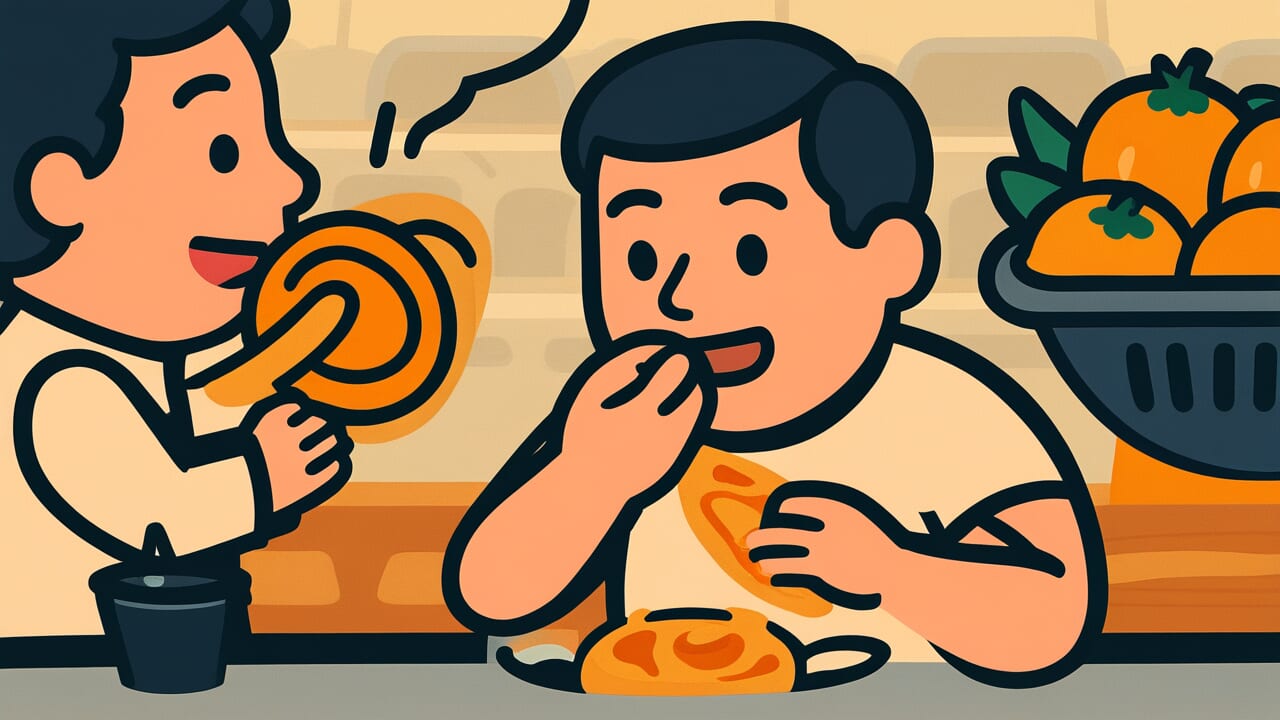How to Read “Delicious food fills the stomach”
Umai mono wa hara ni tamaru
Meaning of “Delicious food fills the stomach”
This proverb uses the fact that delicious food fills your stomach easily to express a deeper life truth. It teaches that good things and pleasures tend to lose their freshness quickly, or that they can have lasting effects on you later.
On the surface, it talks about food. But it actually speaks about various joys and pleasures in life.
Wonderful experiences and pleasant moments feel amazing at first. But as you repeat them, they lose their novelty and you can grow tired of them.
Also, when you get too absorbed in enjoyable things, their effects can catch up with you later.
People use this proverb when good or fun things continue for a while. It serves as a warning to someone enjoying themselves that moderation is better.
Even today, everyone has experienced regret after eating too much delicious food. Or feeling exhausted after getting too absorbed in something fun.
This saying expresses a fundamental human trait through the universal experience of eating. It’s a remarkably accurate observation.
Origin and Etymology
The exact first appearance of this proverb in literature is unclear. However, based on its structure, it likely has deep connections to Japanese food culture.
The expression “Delicious food fills the stomach” seems to describe the physical properties of food at first glance.
People certainly felt that delicious food tends to be nutritious and creates a sense of fullness easily.
But the reason this proverb has been passed down for so long lies in the deep life lesson it contains.
In Edo period common culture, food meant more than just nutrition. The joy of eating delicious things was one of people’s great pleasures.
At the same time, people shared the experience that delicious food leads to overeating, which causes discomfort later.
This saying evolved from talking about food to being used as a warning about various pleasures and joys in life.
It expresses human nature through the familiar experience of eating. Good things actually have lasting effects or become boring more easily.
It may reflect the uniquely Japanese spirit of seeking moderation even in pleasure.
Usage Examples
- The hot spring trip was fun, but three days in a row was exhausting. Delicious food fills the stomach, as they say.
- I got bored eating only my favorite foods every day. Delicious food fills the stomach is really true.
Universal Wisdom
The truth this proverb tells is a deep insight into the mechanism of human joy and satisfaction. Why do good things become boring more easily?
It’s because human senses are relative.
The excitement of eating delicious food for the first time fades with the second and third time. This doesn’t mean your taste buds have dulled.
Your brain simply gets used to the new stimulus. The same applies to all joys in life.
Experiences that felt wonderful at first become ordinary when they’re part of daily life. Eventually they feel insufficient.
On a deeper level, this proverb also shows the truth that “good things leave lasting effects.” Just as eating too much delicious food upsets your stomach, drowning in fun things burdens your mind and body.
Strong stimulation creates strong backlash. This is a law of nature.
Our ancestors understood this human trait. That’s why they conveyed the importance of moderation even in joy through the everyday experience of eating.
Happiness runs away when you chase it too hard. Knowing moderation is the secret to staying happy for a long time.
This timeless wisdom is embedded here.
When AI Hears This
Delicious cuisine is actually a surprisingly low-entropy existence. Entropy means the degree of “disorder.”
A dish that a chef spends hours creating is a “highly ordered state.” It arranges scattered ingredients into a specific placement, temperature, and flavor balance.
However, this order begins collapsing the moment it enters your mouth. Chewing destroys the physical structure.
Digestive fluids break it down to the molecular level. Finally, the intestines absorb it and it scatters throughout the bloodstream.
In other words, “filling the stomach” means the order called cuisine becomes completely homogenized inside the body, reaching a high-entropy state.
What’s interesting is that this process is completely irreversible. Once you eat a dish, you can never return it to its beautiful plating, no matter how hard you try.
As the second law of thermodynamics shows, entropy always increases in a closed system. In the closed space of our body, delicious food is destined to lose its order.
Furthermore, what we feel as “fullness” might be a signal that a high-entropy state has been achieved.
Only the memory of fine dining remains in the brain, while the cuisine as matter disperses without a trace. This is the same path the entire universe follows.
Lessons for Today
What this proverb teaches modern you is how to relate to joy. The pleasure of getting “likes” on social media, the excitement of buying new products, the happiness of eating delicious food.
Modern society is full of stimulation. But once you get used to that stimulation, you’ll notice yourself seeking even stronger stimulation.
What matters is having intervals between enjoying good things. When every day is special, nothing is special anymore.
You eat simple meals sometimes, which makes occasional treats taste truly delicious. Cherish small daily happiness while saving special joys for special times.
This kind of mental space might be the secret to staying happy for a long time.
Also, it’s important to listen to your mind and body so you don’t get too absorbed in fun things and exhaust yourself later.
Good things in moderation. This ancient wisdom can guide you to enrich your life, especially in our overstimulated modern world.



Comments